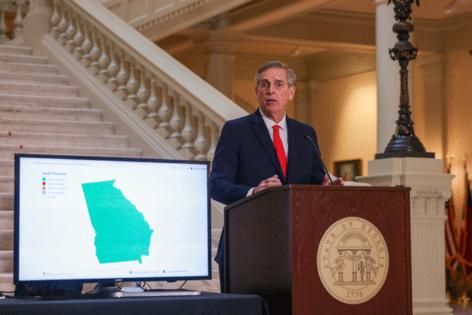Trump's elections order asserts broad power over voting in Georgia and nation
Published in Political News
President Donald Trump’s expansive executive order on elections Tuesday attempts to take control of voter citizenship verification, absentee ballot deadlines and voting technology, but its immediate impact in Georgia appears to be limited.
The order requires citizenship checks and absentee ballots to be returned by Election Day, both of which are already in practice in Georgia except for military and overseas voters, who are allowed three more days to get their votes in.
And while Georgia currently uses computerized QR codes to scan ballots — which the executive order seeks to ban — state legislators are planning to eliminate them.
Trump’s efforts to assert power over elections will likely face court challenges that could delay or invalidate his orders. The U.S. Constitution gives most authority over elections to the states, although Congress has the ability to pass laws such as the Voting Rights Act, which prohibits discrimination in elections.
Trump has frequently complained about elections and claimed they are rigged — an assertion that has been repeatedly debunked. No widespread fraud has ever been found.
Secretary of State Brad Raffensperger, a Republican who resisted Trump’s efforts to reverse the results of the 2020 election, was quick to praise the president’s efforts against noncitizen voting. Noncitizen voting is already illegal in both Georgia and federal elections.
“Thank you, President Trump, for this executive order ensuring that only American citizens decide American elections,” Raffensperger said. “This is a great first step for election integrity reform nationwide. I am the first secretary to conduct a full citizenship check audit of our voter rolls.”
Raffensperger’s citizenship audit found 20 non-U.S. citizens out of the state’s 8.2 million registered voters in October. Election officials canceled their registrations and reported them to prosecutors.
Under Trump’s order, documentary proof of citizenship would be required to register to vote in federal elections. A similar proposal is pending in Congress.
Georgia verifies citizenship before voters are allowed to submit registration applications through the Department of Driver Services. People who register online or with paper forms must provide a driver’s license number or provide proof of citizenship, such as a birth certificate or U.S. passport.
Election law professor Rick Hasen questioned whether Trump has the authority to create rules for federal elections.
“This is an attempted power grab,” said Hasen, who runs the Election Law Blog and teaches at the University of California, Los Angeles. “It’s an infringement on Georgia’s rights to be able to decide how it’s going to run its elections, which is usually something Republicans cared about.”
The executive order also calls on the U.S. Election Assistance Commission, a bipartisan federal agency that certifies election equipment, to issue guidelines that prevent ballots from using barcodes or QR codes under a new set of standards. Federal funding would be conditioned on state compliance.
But Georgia’s voting equipment, which prints QR codes on in-person ballots, is certified under the current standards, and it is unclear how new rules could be imposed nationwide for existing technology. A change in certification standards could require replacement of voting equipment across the country, regardless of whether that equipment relies on QR codes.
Georgia legislators passed a law last year mandating the elimination of QR codes by July 1, 2026, but they have so far resisted funding the $66 million cost to install new voting equipment. Lawmakers have proposed gradually switching the state from touchscreens to paper ballots filled out by hand.
The voting rights group Fair Fight criticized Trump’s order, calling it “a MAGA fever dream,” a reference to the president’s “Make America Great Again” campaign slogan.
“Donald Trump doesn’t want fair elections. He wants control. This executive order is just the latest scheme to rig elections and stop the American people from holding him accountable,” said Fair Fight CEO Lauren Groh-Wargo.
In addition, the executive order directs Elon Musk’s Department of Government Efficiency to review each state’s voter registration list, giving the agency subpoena power to attempt to find fraud.
Georgia election officials regularly cancel outdated voter registrations, though conservatives who challenge voter registrations have said election officials are not doing enough.
Raffensperger’s office announced plans this week to cancel 455,000 outdated voter registrations this summer, one of the largest registration removals in U.S. history.
Trump’s order doesn’t carry the force of laws passed by Congress or rights enshrined in the U.S. Constitution. The changes he’s seeking could eventually be enacted depending on potential court rulings and decisions by the U.S. Election Assistance Commission, which is overseen by two Republican and two Democrats.
©2025 The Atlanta Journal-Constitution. Visit at ajc.com. Distributed by Tribune Content Agency, LLC.




























































Comments